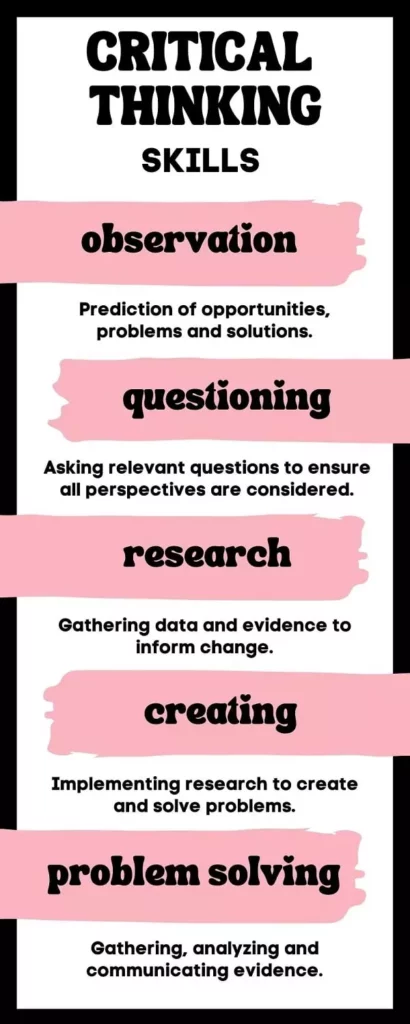There is arguably no more important skill in the modern workplace than critical thinking. The ability to think critically about information and make decisions is key to success in any field, especially for those entering management or leadership positions.
Critical thinking interview questions are one way to help identify which candidates have this valuable skill set – and which don’t! In this article, we’ll provide you with a list of some common critical thinking interview questions.
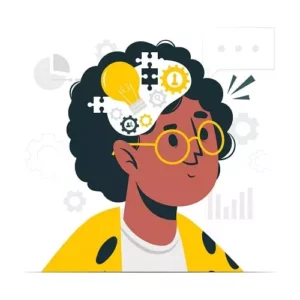
Table of Contents
What is the importance of critical thinking?
Critical thinking is important because it allows individuals to analyze information and make decisions using reason rather than emotion. Critical thinkers can overcome cognitive biases and effectively solve problems.
What are the benefits of critical thinking?
The benefits of critical thinking are numerous. Critical thinkers can think more clearly and effectively, make better decisions, solve problems, and communicate more effectively. They are also less likely to be fooled by misinformation or propaganda.
What are some of the characteristics of a critical thinker?
Some key characteristics of a critical thinker include being open-minded, logical, systematic, and objective. Critical thinkers also exhibit curiosity, skepticism, and humility.
How to improve critical thinking?
Answer: There are many ways to improve one’s critical thinking abilities. Some beneficial strategies include reading, practicing logic problems, and taking classes in philosophy or psychology.
Critical Thinking Skills
- Analytical thinking
- Attention to detail
- Being less likely to be fooled by misinformation or propaganda
- Being open-minded
- Communicating more effectively
- Creativity
- Decision making
- Foresight
- Inquisitiveness
- Intelligence
- Judgment
- Logic
- Making better decisions
- Open-mindedness
- Organization skills
- Overcoming cognitive biases
- Objective Oriented
- Problem-solving
- Reasoning
- Skepticism
- Solving problems
- Systematic thinking
- The ability to make decisions using reason rather than emotion
- Time management skills
- Questioning everything
Critical Thinking Interview Questions
What would it be if you could give one piece of advice for improving one’s critical thinking abilities?
Tip: This question can be tricky, but it’s an excellent opportunity for the interviewer to understand the candidate’s critical thinking style. Some sound advice for improving one’s necessary thinking abilities might include being open to new ideas, questioning everything, and practicing problem-solving skills regularly.
What is your experience with critical thinking?
Tip: This question is asked in various ways, but all variations essentially ask the same thing – have you ever had to use critical thinking skills in a professional setting? What was the situation, and how did you go about it? Candidates who have used necessary thinking skills in their previous jobs generally have an easier time answering this question.
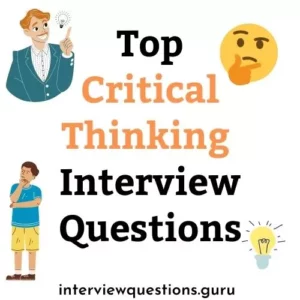
How do you think critically?
Sample Answer: There is no one right way to think critically – everyone does it in their unique way. However, some general tips can be helpful for anyone looking to improve their critical thinking skills. These tips include being organized, asking questions, considering other perspectives, and testing hypotheses.
What is the difference between deductive and inductive reasoning?
Answer: Deductive reasoning is the process of applying general rules to specific situations. This type of reasoning is used to reach logical conclusions. On the other hand, inductive reasoning is the process of inferring specific facts from general observations. This type of reasoning is often used in scientific inquiry.
Example of deductive reasoning
An example of deductive reasoning would be the statement, “All men are mortal.” This statement is a general rule applied to any individual man.
Example of inductive reasoning
An example of inductive reasoning would be the statement “John is a man.” This statement is not a general rule, but rather it applies to one specific person.
Can you think of a time when you were fooled by misinformation or propaganda?
Tip: Propaganda and misinformation can often lead individuals astray by convincing them of things that are not true. Share an experience from your personal life in which you were fooled by inaccurate information.
Sample Answer: A friend told me that eating lots of carrots would improve my vision. I am pretty sure this was an exaggeration about the effect of carrots, but I went ahead and ate them anyway. It wasn’t until years later that I learned eating too many carrots can be dangerous for your health.
What is a cognitive bias?
Answer: A cognitive bias is a thinking error that can lead individuals to make inaccurate judgments or decisions.
Can you give me an example of a cognitive bias?
Answer: One example of a cognitive bias is the sunk cost fallacy. It happens when people continue investing time or money into something based on the belief that they have already invested so much that it would be wasteful to quit now.
How do you arrive at an answer to a problem with multiple solutions??
Tip: The interviewer may be trying to understand the candidate’s critical thinking style by asking this question. Some good strategies for arriving at an answer include considering all possible solutions, testing hypotheses, and consulting experts when necessary.
What is your experience with multiple perspectives?
Sample Answer: I like to approach problems by looking at them from different angles – it helps me come up with creative ideas because I can compare and contrast various perspectives on each issue. This technique has been helpful in many situations where there are only one or two apparent answers instead of several clear-cut choices.
| Must Read |
What are some examples of critical thinking in your life?
Critical thinking can be used in various ways, depending on the situation. Some examples include analyzing data to come up with conclusions, evaluating their validity, and identifying hidden assumptions in ideas or concerns.
Sample Answer: For example, I wrote a paper on the American Revolution when I was in school. Instead of repeating what my textbook said about the events during that period, I conducted research. I did some additional reading to develop my perspective about why certain things happened.
Is there a difference between being intelligent and having good critical thinking skills?
Answer: While intelligence is undoubtedly a valuable asset, it is not always enough to make accurate judgments and decisions. Critical thinking skills are essential because they allow individuals to analyze information carefully and logically to arrive at the most accurate conclusions possible.
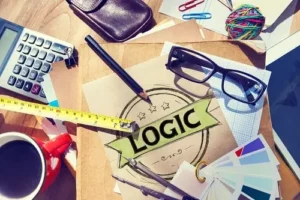
What do you think makes critical thinking so difficult?
Answer: One challenge with critical thinking is that it requires us to be open-minded and consider different points of view. It can be difficult to have strong convictions or feel like we already know the answer.
Additionally, critical thinking can be time-consuming and require a lot of effort. However, these challenges are worth overcoming because critical thinking leads to better outcomes in both personal and professional settings.
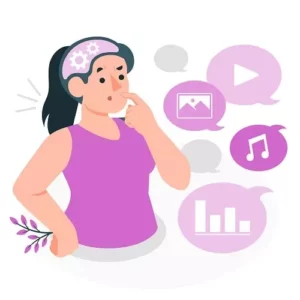
What is the best way to teach someone how to think critically?
Answer: The best way to teach someone how to think critically is by exposing them to new information and allowing them time for reflection. It will help individuals process their thoughts about a particular topic before reaching any conclusions or judgment calls.
What does it mean when we say “a problem well stated is half solved”?
Answer: This phrase means that when we can articulate a problem clearly, we are already on our way to finding a solution. By identifying the issue accurately, we can focus our efforts on solving it efficiently.
What is your experience with making decisions under pressure?
Sample Answer: I’ve had a lot of experience making decisions under pressure. I often had to make snap judgments to respond quickly to changing situations in my previous job. I learned to stay calm and collected even when things were chaotic, which helped me make better decisions overall.
Are you open to new concepts and ideas?
Sample Answer: I am open to new concepts and ideas. I learn best when exposed to further information and process my thoughts about a particular topic before reaching any conclusions or judgment calls.
What are some things you do to stay organized and efficient?
Sample Answer: One thing I do to stay organized and efficient in create a plan of action for each day. It helps me stay on track and ensures that I make the most of my time. Additionally, I try to avoid distractions and keep my workspace organized to focus on the task at hand. Lastly, I take breaks during the day to keep my energy levels high and be at my most productive.
How would you handle a crisis?
Sample Answer: I would handle a crisis by assessing the situation objectively and coming up with a plan of action. I would communicate with all relevant parties, including my team, and make sure that everyone is aware of the situation and what they need to do to help resolve it. I would stay calm under pressure and do whatever is necessary to get the problem under control as quickly as possible.
How do you practice self-care?
Sample Answer: I practice self-care by taking some time each day to do something that makes me happy.
It could be anything from going for a walk or reading a book after work to listening to music during my commute home. The important thing is that it’s something I enjoy and helps me relax to face the world again the next day.
Do you consider yourself a critical thinker?
Sample Answer: I consider myself a critical thinker. I have a lot of experience making decisions under pressure, and I learn best when exposed to further information. I also try to stay organized and efficient to focus on the task. These are all qualities of a critical thinker.
What Is your greatest strength as a critical thinker?
Sample Answer: My greatest strength as a critical thinker is my ability to stay calm under pressure. I can think clearly and objectively in chaotic situations, which helps me make better decisions.
Tell me about a time when you needed to make a decision quickly?
Sample Answer: I recently faced a situation where I needed to make a decision quickly. My team and I were having issues completing some tasks on time, so we decided it would be best for me to take over the project while they focused their efforts elsewhere. It allowed me to complete my work simultaneously, overseeing theirs, making it possible for us to finish on time.
Describe one of the most challenging decisions you have had to make at work?
Sample Answer: One of the most challenging decisions I have had to make at work was hiring a new member for my team. After going through numerous resumes and interviewing several candidates, it became clear that two people would be equally qualified for the role.
To decide which applicant we should hire, we decided on a case study assignment where each candidate was required to solve a problem the same way they would on the job. It helped us gain insight into how each person works and made it easier to determine who was best suited for the role.
Can critical thinking be taught?
Sample Answer: Critical thinking can be taught. A few key things helped me improve my critical thinking skills, such as reading extensively about topics I’m interested in, listening to podcasts and TED Talks, and participating in discussions with others who have different viewpoints.
Having the opportunity to speak with others, I learn a lot about myself and other people’s perspectives. It helps me understand how different thinking styles work, which allows me to consider all of my options when making decisions in the future.
What makes a person a critical thinker?
Sample Answer: I believe that critical thinking is something you are born with, and you hone it as your experience in the world increases. Those who work to improve their skills over time tend to do better than those who don’t practice at all, but everyone has this ability within them somewhere.
Someone’s level of critical thinking can be measured by how well they can make decisions, how open-minded they are, and how well they weigh the evidence before making a judgment call.
What would you do if you needed to decide without complete information?
Sample Answer: In situations where I need to decide without complete information, either because I don’t have all of the facts or there’s too much data to process right away, my first step is to gather as many sources as possible.
Even if that means spending hours upon hours researching and going over every detail until it feels like I have a clear picture of what’s going on, the time spent is always worth it in the end.
Explain your decision-making process.
Sample Answer: My decision-making process usually involves gathering as much information as possible. Once I have a good understanding of the situation, I’ll begin to think about all of the different options available to me and weigh the pros and cons of each one.
After narrowing it down to a couple of choices, I’ll assess how likely it is that I’ll be able to accomplish my goals with each option. Finally, I’ll consider what could go wrong or how things might change if another factor gets involved before deciding on the best one.
If you had to pick just one critical thinking skill, which would you choose and why?
Sample Answer: If given a choice, I would choose the skill of being able to think about things from different perspectives. It has helped me a lot in my personal life and professional career.
Seeing all sides of an issue allows me to develop better solutions and makes it easier to understand others’ points of view. Additionally, it helps me stay open-minded and prevents me from jumping to conclusions too quickly.
Why is critical thinking important in our daily life?
Sample Answer: Critical thinking is essential for everyone in our daily lives because we make decisions every single day. Whether it’s something as simple as what to order off of a menu or more complicated like whether your business needs to switch suppliers, critical thinking allows us to weigh the pros and cons of each choice before making a final decision.
Learn more on Critical Thinking at Stanford
Conclusion
We hope we have provided you with a good understanding of critical thinking and why it’s crucial. Go through all the Critical thinking interview questions and answers explained above and get ready to ace your interview.
If you have any questions or would like to share your thoughts, please feel free to leave a comment below. Also, don’t forget to share this article with your friends and followers!
